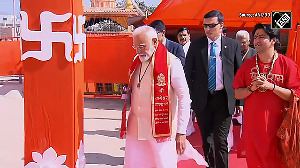Now that the state polls are over, the country's eyes are set on the general elections next year, with political parties looking at the lessons the recent polls hold out for 2009.
Though the Congress bagged three out of the five states which went to the polls, clearly there was no wind blowing for it or for the Bharatiya Janata Party. The two parties were evenly matched in the Hindi heartland and local factors dominated the elections. Normally anti-incumbency takes its toll; this time, the vote was for incumbent governments in Delhi, Madhya Pradesh and Chhattisgarh.
There are two undercurrents discernible in the December polls which could have a bearing on 2009. The first is the changing public mood on terror, the second the doubling of the Bahujan Samaj Party's seat and vote share.
The Mumbai terrorist attacks influenced these elections but not in the way the BJP had anticipated. While it did not provoke a Hindu backlash, it did send the Muslims scurrying into the arms of the Congress. They came out in large numbers to vote in Delhi. The Congress party won even in Jamia Nagar, despite the Batla House encounter -- though it was by a whisker, but interestingly the runner up was the RJD.
After Batla House and the Malegaon blast investigation, there were visible signs of a growing resentment amongst Muslims against the Congress. But this started to abate after the Mumbai Anti Terror Squad zeroed in on Hindu fundamentalists like Sadhvi Pragya Thakur allegedly involved in the Malegaon blast.
The Hindus too were becoming agitated about the alleged involvement of local Muslims, in successive bomb blast. But the Mumbai attack sobered Hindu opinion and showed the country -- Hindus and Muslims -- that the attack was mounted from across the border, with the terrorists trained and armed there.
The urban middle class, particularly in Delhi, did not like the way the BJP tried to encash terror electorally and this was evident in the Delhi results. The chastened mood of the politicians in Parliament, two days after the results, when the debate on terror took place, told its own story. They closed ranks as they have not done in recent years, with the BJP lending total support to the government.
A qualitative change in the public mood on terror, if it continues, could have a bearing on the general elections. It could rob the BJP of an emotive issue it has flogged over the months, and the party will have to do a rethink. It has not been able to overcome its diffidence about fighting polls only on the bread and butter issues, even though this paid the BJP handsome dividends in Madhya Pradesh and Chhattisgarh and in 2003 also it had won on the bijlee-sadak-paani plank. But the BJP is not confident that it can win elections without playing on fears and emotions related to religion.
For the Congress, it may regain some of the Muslim support it had lost in recent months, and without the situation getting polarised along religious lines. Undoubtedly, the minorities will also for other parties, like the CPI and CPI-M, or regional groups in areas where the Congress is weak, like the RJD and the Samajwadi Party.
There is another aspect of the election outcome which could have a bearing on the Lok Sabha polls, and that is the emergence of the BSP as a third force in all the Hindi states that went to the polls recently. The party may not have emerged as the kingpin in government formation, as Mayawati had claimed, at least not yet, but the BSP has improved its vote share -- and number of seats -- to become a headache for the Congress, though this time it also dented the BJP vote.
The Congress is dismissive of the BSP, but the fact of the matter is that the party has demonstrated a three-fold growth in Rajasthan (from two seats to seven) and in Madhya Pradesh (from 2 seats to 6) and also an increase in vote share -- and damaged the Congress in at least twice the number of seats it won. Mayawati can be expected to project herself as a prime ministerial candidate for 2009.
The BSP can now be expected to move strategically and concentrate on constituencies where it smells an opportunity. On the opening day of Parliament, BSP leaders were poring over lists of constituencies to identify those Lok Sabha seats, where, with additional effort, the BSP might stand a chance of winning.
They had, for instance, identified three seats in Delhi NE Delhi, NW Delhi and surprisingly the supposedly middle class South Delhi where the BSP polled anything from 12-31 percent votes in 8 out of 10 assembly segments in each of these three Lok Sabha constituencies. In Delhi, the BSP went up from 0 to 2 seats this time, but notched up 14 percent of the votes, up from just over 5 percent in 2003.
Similarly, the party has identified five such "winnable" Lok Sabha seats in Madhya Pradesh.
At this rate, the party may mop up 10 seats from outside of UP. Its plan is to emerge as the balancing factor for government formation in 2009, and it is going about it very seriously.
The Congress may have retained Delhi and wrested Rajasthan, which will bring it half a dozen additional seats. It is also expected to get more seats in Kerala and Punjab than it did last time, and may improve in Karnataka. But it is two southern states will decide the fate of UPA in 2009 -- Andhra Pradesh and Tamil Nadu. The two states account for around 82 seats. J Jayalalitha -- has tied up with the Left parties -- and her allies are expected to do well in Tamil Nadu this time and it is not clear where the Congress would stand in Andhra Pradesh, with the TDP-Left-TRS on the one hand and Chiranjeevi thrown in the picture on the other.
The Congress is seriously considering announcing the formation of a separate state of Telengana.
The BJP may have retained its hold on Madhya Pradesh and Chhatisgarh -- where it had anyway peaked in 2004 in terms of Lok Sabha seats -- but it has not shown the unity or the resolve to go for the kill, or to revive its fortunes in UP, which could make it a player next time round.
As things stand, both the UPA and the NDA may gain or lose 15-20 seats this way or that in 2009. In such a scenario, the role of the third pool of the non-Congress and non-BJP parties will become critical. The BSP is likely to lead the pack, even though Mayawati is not expected to go for pre-poll alignments. Its growth in the state elections is bad news for the mainline parties.






 © 2025
© 2025